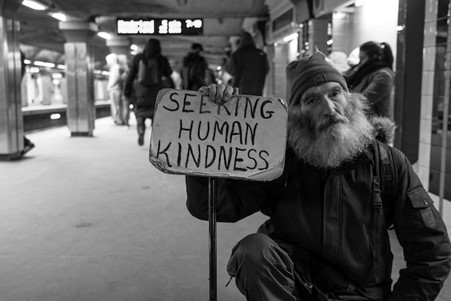Manna Ko, creator of HuMannaTea®, and its purpose to be “All Together for Good,” endeavors to “be” and demonstrate compassion in her daily life. As an author and keynote speaker, Manna Ko has often expressed how much kindness has meant in her own life.
As a “purpose professor™”, she also seeks to encourage kindness in the world, to help people find their voice, and to help others succeed in their calling. She also supports other entrepreneurs and leaders excel in their philanthropic endeavors. Manna Ko explains in the article below just how impactful kindness can be.
It was Martin Luther King Jr. who said, “Love is the only force capable of transforming an enemy into a friend.” In a time when hatefulness, vitriol, and violence seem prevalent, it’s encouraging to think that something as simple as kindness can make a world of difference.
According to the New York Times, random acts of kindness have the potential to make a huge difference in someone’s life. Not only that, it has been documented that living a life of daily kindness has a myriad of benefits that affects people spiritually, psychologically, and physically.
Spiritual Benefits
Your Purpose Professor™
As previously stated, kindness can have an effect on an individual spiritually, including how it can help you find our purpose. In fact, kindness is one of the prerequisites to finding your purpose!
Being authentic, with kindness, compassion and empathy not only opens up many new doors for relationships, kinship, and friendship, it frees us from distress so we can be free to express our creativity, and thus, find and live our passion and purpose.
Kindness can make the journey towards your destiny become much more joyous and certainly more meaningful.
Plant 2 Trees with 1 Seed™
Manna Ko says that kindness is often described as “the virtue of being compassionate, generous, and considerate, especially when it’s not easy to do so.” It could also be said that kindness is a way of life, or a state of being.
Furthermore, since kindness affects relationships and societies and, it has the ability to change the world. When a person is kind, caring, and living in service to others, it not only helps the receiver of the interaction flourish, it could potentially help entire communities flourish.
The Ripple Effect
Manna Ko says that being kind and compassionate often results in more kindness—the ripple effect. When one person does something good for another, a ripple effect is created, eventually reaching communities, cities, or even countries! Anything is possible with love leading the way.
A study in Spain demonstrated that a person who sought to be kind or demonstrate generosity of heart, benefited even more than those who received the expression because it made those giving individuals feel happier and less depressed. Studies have also found that when one person is friendly, courteous, or kindhearted towards others, not only do the recipients feel affected, the recipients will often continue putting forth a similar effort towards those they encounter during their day.
The Link Between Kindness and Empathy
Manna Ko says that kindness has a symbiotic relationship with empathy, something the world all needs, especially today. Understandably, people can’t be upbeat and “happy” all the time; there are bound to be times when someone has a bad day, or they are dealing with life challenges.
This is when kindness matters most to many. When we know someone is struggling, being kind and sensitive can be the unconditional show of love they need to overcome their difficult situation.
As we all know, there is no shortage of “misunderstandings” in our world; we are all too easily offended or slighted. However, being charitable and empathetic can be a powerful way to inspire (and lead) others to choosing more altruistic responses and behaviors.
Rising above disagreements, and even insults, shows that winning the person matters more than winning the argument – and this can be the difference between building or dividing the relationship. The choices we make in these moments can affect generations to come.
 Psychological Flourishing
Psychological Flourishing
Psychology is the study of human behavior, and various studies have found that being kind has many positive effects on human psychology.
Psychological flourishing is when a person’s (or group of people’s) emotions and social well-being are measured at the beginning and end of an experiment. In one study, a group of people were asked to carry out acts of kindness for themselves and/or others for one month.
Manna Ko explains that this study found that those individuals who were kind to others during the study had higher psychological flourishing and felt more positive emotions than those who were only kind to themselves. That’s not to say that those who experienced self-care fared poorly; they just scored lower than those who demonstrated kindness to others as well.
Positive Emotions
Experts have found over and over again that when acts of kindness are achieved, people feel a flood of positive emotions such as cheerfulness, confidence, optimism, and hopefulness. They also tend to feel more satisfied within their own lives.
Being the recipient of kindness when life gets difficult is one of the best ways to stimulate oxytocin, and with oxytocin comes other beneficial physical effects detailed below.
Physical Effects
The Boomerang Effect
Studies show that physically, kindness can have various, positive long-term effects on the human body. Similar to the ripple effect, the boomerang effect is the notion that when a person acts kindly, this charity then circles back to benefit the giver.
Of course, we don’t act this way for the sole purpose of personal gain; we do so because our soul and our spirit feel vibrant and alive when we do. Something in our DNA resonates with kindness and compassion —the giving of it, and the receiving of it.
Psychology Today notes the production of oxytocin (otherwise known as the love hormone) has been noted for the duration of, and subsequently, after acts of kindness and compassion.
Manna Ko explains that many medical studies show how oxytocin has appeared to offer other wonderful benefits, such as the protection of the cardiovascular system, the repairing of damage from environmental stress, and the reduction of inflammation in the body.
Reducing Inflammation
Studies also show that many illnesses such as diabetes, obesity, and migraines can be due to stress and inflammation in the body. Being kind (which can increase oxytocin) has been documented to lower this type of inflammatory response, aiding in reduction of cortisol levels, as well as weight and headache management.
Anxiety And Stress Reduction
An excellent way to reduce anxiety and stress is to live a life of kindness and compassion. A study from the University of British Columbia studied the concept of “positive affect” (PA), the measurement of a person’s experience with positive moods. The study found that individuals who had positive attitudes and met the world with kindness led to a high PA level. Many of those individuals also felt less anxiety in social settings.
In Summary
Manna Ko says that kindness also ties directly to professional and social interactions and plays a big role in building relationships. When people have positive interactions with others, their stress is reduced, and it can also provide an outlet for people to create a safe environment for others.
There is a reason that Manna Ko strives for kindness in her daily life—it is the best way to live. Being kind, compassionate, and empathetic helps both the receiver and the giver. If you feel you are lacking kindness in your daily life, try to slow things down and focus on being a source of kindness. You will see the numerous benefits of being kind and help make the world a better place.








